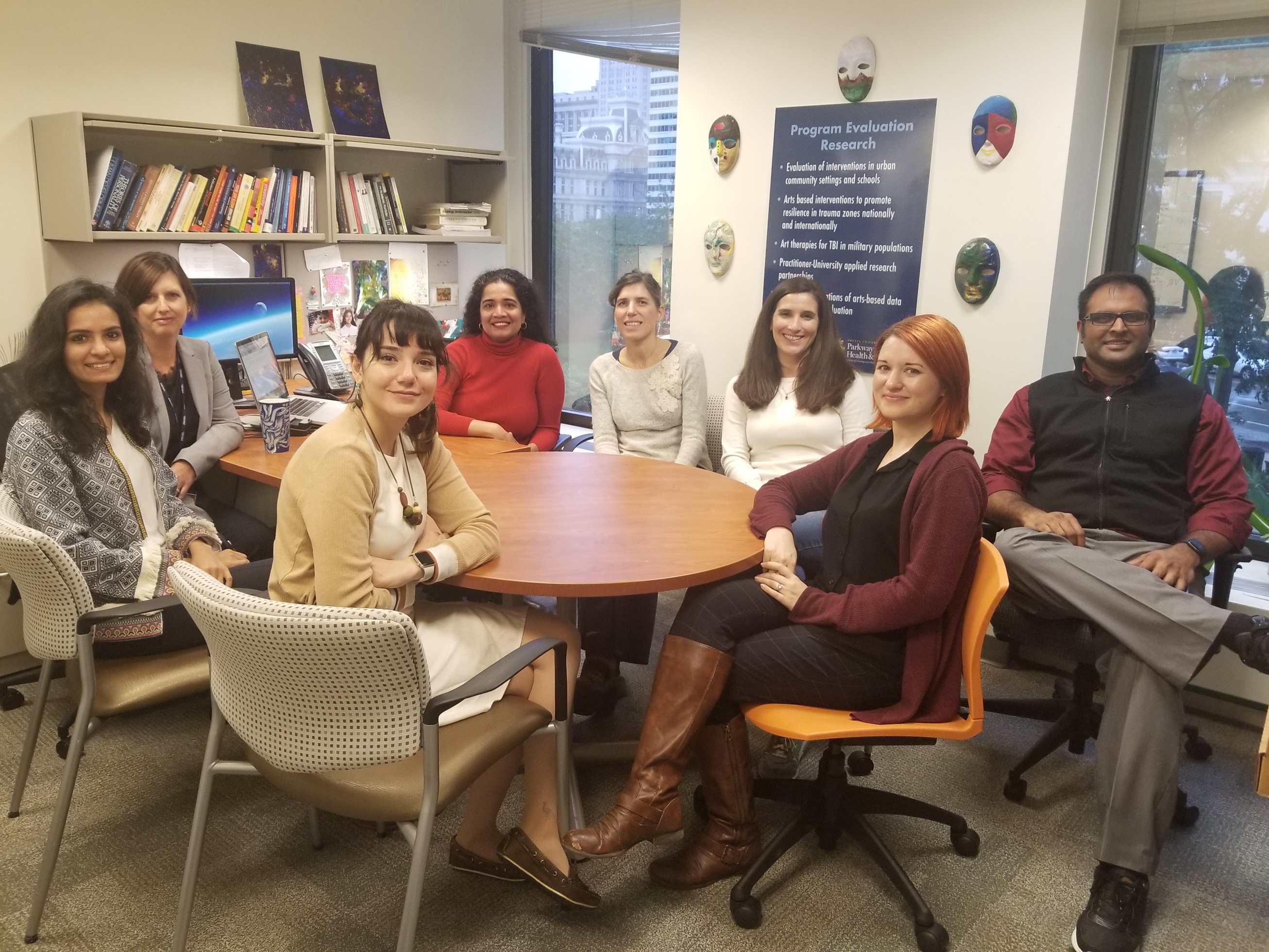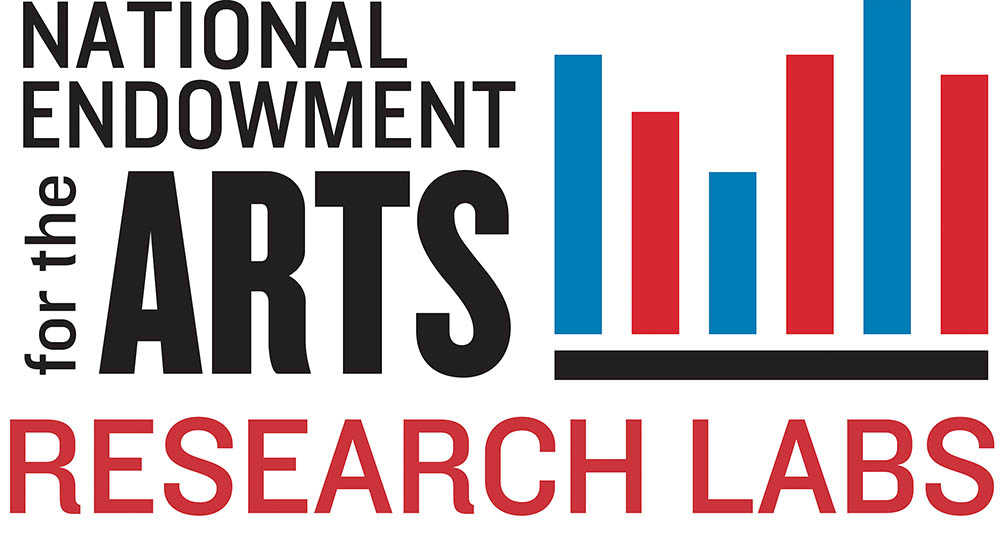
Our lab conducts research and evaluation studies that examine health outcomes of art therapy and arts-based interventions. In addition we evaluate psychosocial learning outcomes of school based educational interventions (in the US and internationally).
The lab is led by Girija Kaimal, EdD, and her expertise lies in the areas of health outcomes of creative self-expression, art therapy research, program evaluation, qualitative and mixed-methods research.
She is the Principal Investigator for the first qualitative study funded by the Department of Defense on Gulf War Illness. She is also the PI for the National Endowment for the Arts Research Labs cooperative agreement, examining outcomes of art therapy for in hematology/oncology settings as well as military service members with PTSD and TBI. She is PI on a series of studies that examine the health outcomes of visual self-expression arts including changes in physiological indicators (like salivary cortisol, amylase, IL10, TNF alpha), brain activation (as measured by functional Near Infrared Spectroscopy, fNIRS) as well as psychological indicators like mood, perceived stress, and, self-efficacy. These studies include healthy adults participants as well as caregivers of patients facing chronic and terminal illnesses. Most recently she is examining outcomes of virtual reality artmaking using FNIRS technology. This study is being conducted in collboration with the International Arts+Mind Lab at Johns Hopkins University.
In addition, she has a portfolio of research and evaluation studies funded by the US Department of Education, National Science Foundation as well as several foundations. Her grant funding to date totals approximately $3.3 million. Kaimal also serves as a research advisor to Oxfam America and Save the Children on international projects that examine issues of disparity related to gender, and, the role of the arts in education and human development. In a recent multi-year evaluation study on leadership development funded by Lehigh University (through a grant from the U.S. Department of Education) we are examined how participation in the arts could ignite learning transfer to leadership practices. Other prior research experiences include conducting secondary analyses of qualitative data from a National Institute of Mental Health (NIMH) longitudinal study of depression in families; and; a multi-disciplinary study on the outcomes of genetic testing for hearing loss funded by the National Institute of Deafness and other Communication Disorders (NIDCD).
The HALE lab research team has presented and published peer-reviewed journal articles on the role of changes in neuroinflammatory markers as a result of art making, technology in art therapy practice, the psychosocial outcomes of arts participation across the life span, and using narratives in research.
Keywords: Visual self-expression, stress, art therapy, health outcomes, biomarkers, military, hematology/oncology, caregivers, virtual reality, indigenous and traditional art forms
Principal Investigator
Girija Kaimal, EdD, ATR-BC
Associate Professor - Counseling and Family Therapy
Health Sciences Building, 11th Floor, Room 11W22
60 N 36th Street, Philadelphia, PA 19104
Phone: 215.262.8914
Email: gk27@drexel.edu
ARTS RESEARCH on CHRONIC STRESS (ARCS) NEA Research Labs

Drexel University is the recipient of an inaugural grant under the National Endowment for the Arts’ Research Labs initiative. The lab at Drexel—Arts Research on Chronic Stress (ARCS). This lab conducts research studies at the intersection of the arts, health, and social/emotional well-being. In addition to the research studies, the lab also connect creative arts therapies with community-based arts organizations to enhance social engagement and overall well-being in those who have been affected by prolonged stressors such as chronic pain, extended caregiving, academic stress, and trauma. In the future we will feature findings from the studies including short-term/interim deliverables; working drafts/final versions of policy briefs, literature reviews, white papers, technical guide for the field.
The lead investigators for the studies are Dr. Kaimal, EdD, MA, ATR-BC (PI, Associate Professor, PhD program in Creative Arts Therapies and Dr. Bradt, PhD, MT-BC (Co-PI, Professor, PhD program in Creative Arts Therapies).
CURRENT STUDIES: 2019-2021
Art Therapy in a hematology/oncology/bone marrow transplant clinics for Pediatric, Adolescent, and Young Adult patients: A pilot multi-site mixed methods observational study
Psychosocial challenges are a well-established concern for pediatric, adolescent and young adult and hem/onc patients and their caregivers. Medical art therapy is a clinical intervention that addresses the psychosocial support needs of patients and families in healthcare settings. There are however, few systematic studies that have examined clinical outcomes of art therapy for pediatric, adolescent and young adult patients, families and healthcare providers, and none that have examined key psychosocial outcomes of art therapy, such as changes in affect, anxiety, as well as quality of life. The main objective of this pilot mixed methods observational research study is to examine the associations between participation in open studio art therapy and outcomes of psychosocial well-being among pediatric, adolescent and young adult hematology/oncology patients, families, and healthcare providers. This study is being conducted in collaboration with Tracy’s Kids, Medstar Georgetown Hospital, Children’s National Hospital, New York Presbyterian and Methodist Hospital in San Antonio.
A randomized controlled trial of art therapy for service members with traumatic brain injury (TBI) and psychological health conditions
TBI has been called the signature injury of OEF and OIF, primarily related to the increased survival rates of wounded Service Members (SMs) and the increased number of brain injuries related to blast exposures. Many of these SMs experience psychological health issues related to both neurologic injury and psychological trauma associated with combat experiences. To date these psychological difficulties have been primarily treated through traditional behavioral health services, although recent research is suggesting that art therapy is an effective complementary therapy as it allows SMs additional avenues by which to process, identify, and address their psychological difficulties using verbal and non-verbal methods. Although art therapy has been shown to be related to positive health outcomes in program evaluation studies of active duty military SMs with TBI and post-traumatic stress additional research is needed to determine its effectiveness with SMs with TBI and psychological health disorders. With this in mind, the current study proposes to evaluate the effectiveness of art therapy as a complementary therapy to standard behavioral health services in service members with TBI and psychological disorders. The goal of the study is to evaluate the effectiveness of art therapy as a complement to other behavioral health interventions in the treatment of psychological difficulties in service members (SM) with traumatic brain injury (TBI). The study is being conducted at Camp Lejeune.
The impact of music therapy on post-surgical pain management
In light of the current opioid crisis in the United States, there has been increased attention to the use of non-pharmacological pain management interventions following surgery to help prevent the development of persistent post-surgical pain. Research on the use of music for pain management has been rapidly growing in the past two decades, but studies on music interventions for post-surgical pain management to date have been limited to short-term impact of music interventions (i.e. 1-2 post-operative days). The purpose of this feasibility study is to examine the impact of a brief music therapy intervention versus standard care on post-surgical pain management and opioid use in 24 patients with elective total knee replacement surgery. The music therapy intervention is led by a board-certified music therapist and is aimed at teaching surgical patients music-based pain management skills to aid with pain management following surgery. Study outcomes include pain intensity, pain-related self-efficacy, physical functioning, and opioid use. Pain intensity and opioid use will be obtained daily for the first 5 postop days. In addition, pain intensity, opioid use, physical functioning, and pain-related self-efficacy will be obtained at 2 weeks, 6 weeks and 3 months following surgery.
Group music therapy for chronic pain management with military personnel
In 2016, the Centers for Disease Control and Prevention issued recommendations to move away from opioids and instead use non-pharmacological therapies for the treatment of chronic pain. The use of music for the management of chronic pain is increasingly gaining interest but more efficacy research is needed to encourage healthcare providers to recommend its use to patients. Moreover, the majority of research studies on music for pain management to date have focused on the analgesic effects of music for acute pain conditions (e.g. procedural pain, post-surgical pain) and have predominantly included civilian populations. The purpose of this feasibility study is to examine the effects of a 6-week standardized group music therapy treatment protocol on core outcomes in chronic pain management for service members at Eglin Air Force Base. The music therapy protocol consists of six weekly 90-minute sessions with 6-8 participants per group. Sessions are conducted by a board-certified music therapist. The treatment is based on a biopsychosocial approach to chronic pain management. Participants engage in interactive music making experiences specifically designed to address bioneurological, cognitive, emotional, and social aspects of pain perception and pain management. The protocol has been tested in civilian populations with promising results.
COMPLETED STUDIES: 2017-2019
STUDY 1: HEALTH OUTCOMES OF VISUAL SELF-EXPRESSION FOR PATIENTS AND CAREGIVERS OF PATIENTS WITH CANCER
Girija Kaimal, EdD, MA, ATR-BC led the study on arts-based approaches to promoting health and well-being for caregivers of patients with cancer. The study compared outcomes from two brief visual self-expressive approaches with patients, family caregivers and professional healthcare providers. The study was conducted in collaboration with the Radiation Oncology Department at the University of Pennsylvania. Caregivers of patients receiving treatment at the center, as well as health care providers, were recruited to participate. The variables to be examined in the study included affect, mood, perceived stress and indicators of physiological health. The community component of the study included a public exhibition of artwork created during the study. The aim was to examine how integration of arts into different aspects of healthcare can impacted both quality of life and quality of care.
Research team:
Dr. William Levin, MD: Penn Medicine
Juan Muniz, PhD, Lab analyst, Drexel University
Janell Mensinger, PhD, Statistician, Drexel University
Ms. Jess Drass, Graduate Research Fellow, Drexel University
Ms. Rebekka Dieterich-Hartwell, Graduate Research Assistant, Drexel University
Ms. Katrina Carroll, Graduate Research Fellow, Drexel University
Publications:
STUDY 2: CREATIVE MUSIC ENGAGEMENT TO IMPROVE CORE OUTCOMES IN CHRONIC PAIN
Joke Bradt, PhD, MT-BC will lead a mixed methods study that examines the effects of a 12-week music therapy treatment (MT) program followed by participation in community-based music groups compared to a waitlist control group on chronic pain management. The following outcomes will be measured: pain-related self-efficacy, pain interference, pain intensity, emotional distress, physical functioning and participation in social activities. The feasibility of post-intervention community music engagement in people with chronic pain will be tracked. Semi-structured interviews will be conducted with study participants about their experiences of the MT intervention and their participation in community-based music groups. The purpose of these interviews is to help explain treatment outcomes and enhance understanding of possible barriers and facilitators of treatment success. Our community partner for this project is the Settlement Music School (www.settlementmusic.org), one of the largest nonprofit community schools of the arts in the U. S. The School provides 10,000 weekly services of individual lessons, classes and activities in music, dance and visual arts to children and adults throughout Philadelphia.
Research team:
Fenqing Zhang, PhD, Statistician, Drexel University
Amy Kesslick, MA, MT-BC, music therapy clinician, Stephen and Sandra Sheller 11th Street Health Services, Drexel University
Mark Bottos, MCAT, Zausmer Program Director of the Kardon Center for Arts Therapy, Settlement Music School
Ming Yuan Low, MCAT, Graduate Research Fellow, Drexel University
Clarissa Karlsson, MT-BC, Graduate Research Fellow, Drexel University
Publications:
Papers, Media, and Technical Reports
Peer-Reviewed Publications
Reflection Papers
DISCLAIMER
The opinions expressed are those of the author(s) and do not represent the views of the National Endowment for the Arts Office of Research & Analysis or the National Endowment for the Arts. The National Endowment for the Arts does not guarantee the accuracy or completeness of the information included in this material and is not responsible for any consequences of its use.